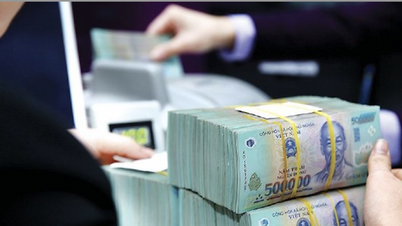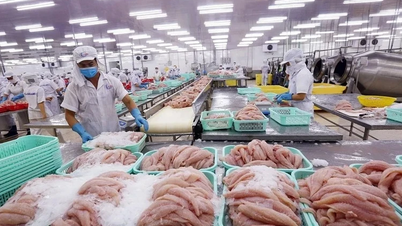According to Ms. Pham Mai Phuong, Deputy General Director of Great Market Global Vietnam Co., Ltd. ( Hai Phong ), her company currently has many factories in localities such as Hai Phong, Hung Yen, Thanh Hoa, Nam Dinh, producing spandex yarn products, socks, dyed yarn, seamless knitted products... and more than 10,000 workers.
With 8 factories in continuous production, the company has a huge demand for electricity. "On average, the company spends nearly 2 billion VND on electricity each month. Now the electricity price has increased by 4.8%, it is estimated that each month the business will spend hundreds of millions of VND more. Now every cost is very important, any increase will put pressure on the business. In addition, each stage only needs to increase by 0.1% to cause the output price of the product to increase, while Vietnamese goods are already facing fierce competition with other competitors, so increasing prices is taboo." Mrs. Phuong said.

Similarly, Ms. Pham Thi Nham, the leader of a large food company in Hanoi , also said that in recent days, the Board of Directors has been meeting continuously to plan how to deal with the increase in electricity prices. All monthly expenses are specifically listed, from which unnecessary expenses will be reduced, even cut, to save money to pay for the increased electricity bill.
" On average, every day the company provides meals to more than 200 schools and industrial parks in Hanoi, Nam Dinh, Thai Binh, Bac Giang , and Hung Yen. Along with that, the company also has a processing workshop of thousands of square meters, with cold storage to preserve hundreds of tons of food. When the electricity price had not increased, the company had to pay about 1.4 billion VND for electricity each month. Now that the electricity price has increased by 4.8%, combined with the cumulative electricity bill, the electricity bill can increase by hundreds of millions of VND/month. This is a large amount of money, causing many difficulties for the company," Mrs. Nham said.
Mr. Vu Duc Giang - Chairman of the Vietnam Textile and Apparel Association, Chairman of the Board of Directors of Viet Tien Garment Joint Stock Corporation, Chairman of the Board of Directors of Garment Corporation 10 - expressed his opinion: The increase in electricity prices is understandable because society and businesses must share the difficulties with the electricity industry. However, all adjustments need to be carefully calculated in terms of the impact on people's lives and business operations. Therefore, ministries, branches and EVN need to have long-term calculations.
"If electricity prices increase every 3 months, it will cause many difficulties for businesses, because they will not be able to proactively calculate the cost of a product. Meanwhile, negotiating prices with partners requires stability and initiative. Businesses also cannot raise product prices to prepare for electricity prices to increase after 3 months. Because that will reduce the competitiveness of goods," Mr. Giang said.
According to Mr. Vu Duc Giang, including this increase, from 2023 to now, electricity prices have increased by a total of 17%. For the textile and dyeing industry, electricity input costs account for 9-12% of product costs. For the garment industry, electricity accounts for more than 1.8%. Therefore, increasing electricity prices will contribute to increasing the cost of goods, while Vietnamese goods are already weaker than other countries in terms of technology and human resources.
Mr. Nghiem Xuan Da - Chairman of the Vietnam Steel Association (VSA) - also said that the continuous increase in electricity prices over the past 3 years has caused many difficulties for the steel industry in particular, especially factories using electric furnace technology with high demand. “Depending on each unit and the technology used by the factory, electricity consumption accounts for 5-8% of the product cost. The recent 4.8% increase in electricity prices will cause steel prices to increase by 3-5 USD/ton, equivalent to 50,000 - 135,000 VND/ton.
Struggling to maintain selling prices, headache looking for solutions
With the mindset that increasing selling prices is only a last resort, most businesses are trying to maintain the output price of their products. At the same time, they are looking for ways to save on electricity bills.
Ms. Phuong shared that the company has proactively used energy-saving devices, installed rooftop solar panels, and used solar panels to heat water for the dyeing process.
“We also use LED lights to save electricity, and use smart inverter power saving devices to automatically adjust the light intensity to the correct level of use to avoid wasting electricity, and use induction electrical devices to automatically turn off and on the power when no one is around.”, Mrs. Phuong said.
Similarly, Ms. Pham Thi Nham's company has also installed a solar power system on the roof, helping to reduce total monthly electricity consumption by 3.5%. " In the near future, we will ask workers to come to work earlier in the morning or take advantage of the evening shift more to reduce electricity use during peak hours ," Ms. Nham added.
Meanwhile, Mr. Nghiem Xuan Da recommended that businesses should adjust their production plans accordingly, including production during off-peak hours with an electricity price of 1,300 VND/kWh, nearly 2/3 lower than peak production at 3,640 VND/kWh.
“There are factories or stages that are part of the technological structure and cannot be changed, but only production hours can be changed accordingly. However, in the long term, businesses must also apply high technology to use less energy and reorganize production more reasonably.
As for EVN, it is necessary to extend the time for increasing electricity prices so that industries can stabilize and proactively plan production, business, and sign contracts with partners. In addition, when announcing an increase in electricity prices, there should be a certain delay, not just signing the decision one day and announcing it immediately the next day, making it difficult for businesses to handle it in time," Mr. Da suggested.
Source: https://baoquangninh.vn/gia-dien-tang-4-8-doanh-nghiep-dau-dau-lo-chi-phi-3358182.html






![[Photo] Prime Minister Pham Minh Chinh chairs a meeting on the implementation of the Lao Cai-Hanoi-Hai Phong railway project.](https://vphoto.vietnam.vn/thumb/1200x675/vietnam/resource/IMAGE/2025/5/20/0fa4c9864f63456ebc0eb504c09c7e26)






















































































Comment (0)